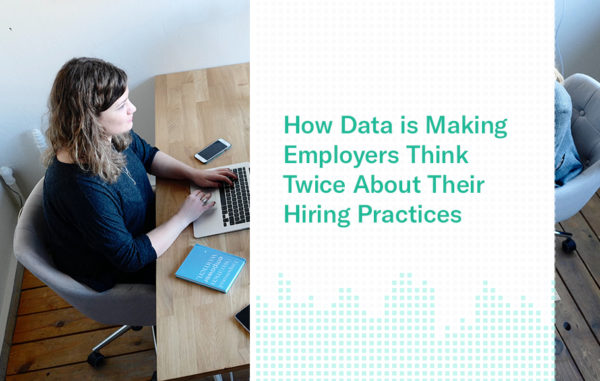With the unemployment rate dipping below 4 percent for the first time since 2000, job seekers are in the driver’s seat. Employers looking to snag the best candidates have turned to the data to learn how to get a leg up. This week on the Deciding by Data podcast, we sat down with Kathryn Minshew, the co-founder and CEO of the careers platform, The Muse. She helped us understand how new insights are shaping how employers think about their business talent solutions.
1. Many companies are realizing that how their treat their candidates can impact their bottom lines
Before she started The Muse, Minshew remembers scrolling through beautifully photographed merchandise while shopping online. Curious about their careers, she clicked on the company’s jobs section and was surprised to find a drab page that failed to market their careers the same way as their products. This experience highlights a fact that many organizations are beginning to embrace: your candidates are also your customers, so how you treat them matters.
“Forty-four percent of people who have a negative experience applying to a company say they will sever their business relationship with that organization,” Minshew says. “And there have been follow-up studies that prove people will stop buying your product. They will tell their friends and family not to go work for you. And so, it’s just changing the game in terms of how companies are thinking, they have to approach recruiting candidates. And likewise, I think individuals are really raising the bar and what they expect.”
2. Automation can make hiring more efficient, but only if it doesn’t eliminate the human touch
If you’ve gone on a job interview in recent years, you might have gone through several steps of the process without ever talking to another human. From scheduling and assessments to automated interviews recorded through a computer screen, tech has taken a hold in the hiring process.
But Minshew warns that it is possible to have too much of a good thing.
“I’ve been a little troubled by this trend that has popped up in a few recruitment companies to automate everything,” she says. “I am a big believer that part of what’s been a positive development in the entire talent ecosystem in the last decade is this movement away from being highly transactional and just processing candidates as if they were numbers or resumes, and towards thinking about how do we get the right fit, how do we treat people, even if it’s at scale, how do we treat people well?”
She says giving candidates a human touch is more than just a courtesy — it’s a competitive edge.
“[I]f you want to hire really talented people that are competitive and you want to get them to your business, away from your competitors, giving them a bot to talk to when they’re trying to really engage with a human is probably not going to be a winning strategy,” Minshew says. “Because if that other company gives them a human, that makes a huge difference to candidates. They want to feel respected and valued because they are a human investing their time.”
3. Company culture is in the eye of the beholder
The way someone describes their company’s culture can vary greatly depending on whether they are managers or employers. Minshew told us about a tool The Muse calls “Brand Builder” that they use to help companies understand what their employees think of their culture. The Muse will send their clients’ employees unique links to fill out a “Mad Libs” style questionnaire about their job and company. The employees get a concise summary of what they do, which they can use as a bio on sites like LinkedIn. Employers, on the other hand, get to see what their workers really think about their organization.
“I think that there is a gap in a lot of companies between what they think is the truth about their employee experience, and what’s actually the truth,” Minshew says, “and so we are aiming to provide more of a grounding in data as well as in content.”
Want to find out how data can drive your business into the future? Request a demo of Indicative today!
